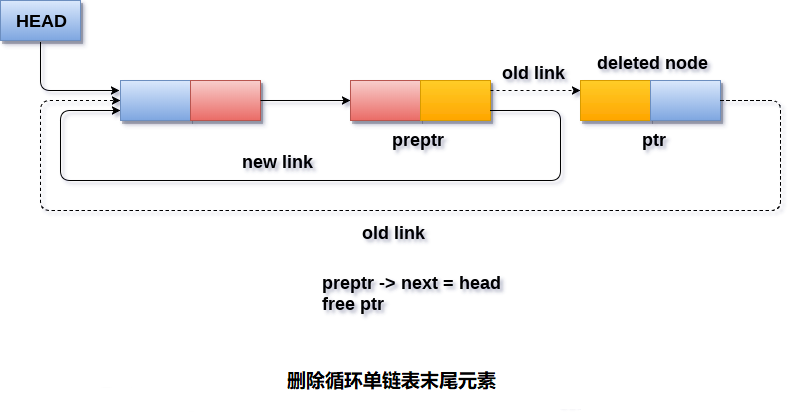刪除迴圈單連結串列末尾元素
2019-10-16 22:03:00
在迴圈單連結串列中刪除末尾節點有三種情況。
情況1(連結串列為空)
如果連結串列為空,則條件head == NULL將變為true,在這種情況下,只需要在螢幕上列印下溢並退出。
if(head == NULL)
{
printf("UNDERFLOW\n");
return;
}
情況2(連結串列包含單個節點)
如果連結串列包含單個節點,則條件head->next == head將變為true。 在這種情況下,需要刪除整個連結串列並使頭指標空閒。 這將通過使用以下語句來完成。
if(head->next == head)
{
head = NULL;
free(head);
}
情況3(連結串列包含多個元素)
如果連結串列中有多個節點,那麼要刪除最後一個節點,需要到達最後一個節點。 還需要跟蹤連結串列的倒數第二個節點。 為此,需要定義兩個指標ptr和preptr。 以下程式碼序列用於此目的。
ptr = head;
while(ptr ->next != head)
{
preptr=ptr;
ptr = ptr->next;
}
現在,需要再做一次指標調整。需要將指標指向pretr的next指向ptr的next(即head),然後使指標ptr空閒(釋放)。
preptr->next = ptr -> next;
free(ptr);
演算法
第1步:IF HEAD = NULL
提示 「記憶體溢位」
轉到第8步
[IF結束]
第2步:設定PTR = HEAD
第3步:重複第4步和第5步,同時PTR - > NEXT!= HEAD
第4步:SET PREPTR = PTR
第5步:SET PTR = PTR - > NEXT
[迴圈結束]
第6步:設定PREPTR - > NEXT = HEAD
第7步:釋放PTR
第8步:退出
示意圖

C語言實現範例程式碼 -
#include<stdio.h>
#include<stdlib.h>
void create(int);
void last_delete();
struct node
{
int data;
struct node *next;
};
struct node *head;
void main()
{
int choice, item;
do
{
printf("1.Append List\n2.Delete Node from end\n3.Exit\n4.Enter your choice?");
scanf("%d", &choice);
switch (choice)
{
case 1:
printf("Enter the item\n");
scanf("%d", &item);
create(item);
break;
case 2:
last_delete();
break;
case 3:
exit(0);
break;
default:
printf("Please Enter valid choice\n");
}
} while (choice != 3);
}
void create(int item)
{
struct node *ptr = (struct node *)malloc(sizeof(struct node));
struct node *temp;
if (ptr == NULL)
{
printf("OVERFLOW\n");
}
else
{
ptr->data = item;
if (head == NULL)
{
head = ptr;
ptr->next = head;
}
else
{
temp = head;
while (temp->next != head)
temp = temp->next;
ptr->next = head;
temp->next = ptr;
head = ptr;
}
printf("Node Inserted\n");
}
}
void last_delete()
{
struct node *ptr, *preptr;
if (head == NULL)
{
printf("UNDERFLOW\n");
}
else if (head->next == head)
{
head = NULL;
free(head);
printf("Node Deleted\n");
}
else
{
ptr = head;
while (ptr->next != head)
{
preptr = ptr;
ptr = ptr->next;
}
preptr->next = ptr->next;
free(ptr);
printf("Node Deleted\n");
}
}
執行上面範例程式碼,得到以下結果 -
1.Append List
2.Delete Node from end
3.Exit
4.Enter your choice?1
Enter the item
90
Node Inserted
1.Append List
2.Delete Node from end
3.Exit
4.Enter your choice?2
Node Deleted